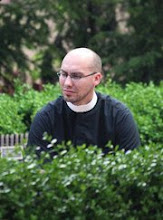Who is a Pastor?
"The truth is, the pool of available pastors out there is comparatively small. Some people imagine they can find a young pastor with lots of experience. Few pastors have twenty years of experience yet are only thirty-four years old. Further, among the pastors who are out there are a number still thinking and behaving as though this is a churched culture. They do not seek people out. They spend most of their time inside the church. They wait for people to find the church. Just enough people do so to create the illusion that the long lost churched culture still exists. In our time, a congregation benefits from having a congregational, community, missional pastor, not a professional, churched, cultured pastor" (25).
Now perhaps I am overly sensitive since I am churched and cultured (or so I like to think) and insist on a professional (and educated) clergy. If I am being overly sensitive, I trust you all will point that out. What I have a beef with is the false dichotomy I believe he is setting up. Does one have to be either "congregational, community, missional" or "professional, churched, cultured"? The underlying question is who is a pastor and what does a pastor do?
I have thought about this alot recently. Callahan insists that pastors who spend most of their time "inside the church" are missing the mark. Really? If you asked me my top three priorities as a pastor, I would tell you:
1) I am the lead worshipper. Life in the Kingdom of God revolves around our worship. It is to worship that we are gathered. It is from worship that we are sent. As the lead worshipper, the pastor faithfully preaches the word and rightly administers the sacraments. However, this entails much more than just the Sunday service. It entails visitation of the sick and the homebound, making sure none are neglected. It entails providing care and counsel to those in crisis so they can in good faith hear and receive. The pastor as lead worshipper preaches/teaches, administers the sacraments, visits the sick and shut ins, and provides pastoral care and counsel to those in need.
2) I am the lead visionary. The Jewish prophet’s single task was to call the people to faithfully embrace their identity as the people of God and to live their life together in such a way that they were an embodiment of God’s love and peace in the world. As the lead visionary, the pastor first embodies among the people a different kind of life. In living that kingdom life, the pastor constantly paints a picture of what the Kingdom of God must look like in the context of a particular community. The pastor then is a constant reminder that our mission in the world is to bear witness to the reign of God among us and in our world. The pastor as lead visionary casts a vision and calls the people to embrace the call and embody his kingdom.
3) I am the lead steward. Stewardship is about making sure the people have what they needed to thrive and be healthy. The Church of the Nazarene has designating the pastor as the CEO. The CEO is not a power figure, but rather an administrative figure. The CEO is responsible for the health/success of the organization. This is done by knowing its resources and appropriating them wisely and diligently. Likewise, the pastor must be a faithful steward of the churches resources: passions, gifts, finances, time, facilities, etc. This however, cannot be done alone, every CEO has a primary task of developing leaders to oversee and lead specific areas so that she can see clearly the big picture. The pastor as lead steward develops leaders to oversee the various ministries of the church.
Those three things, patterned after the offices of Christ (Prophet, Priest, and King) comprise the pastor's job description. And guess what. They are all done inside the church. That is not to say that the pastor should be singularly focused inwardly. Quite the contrary. Each of these offices must be approached missionally (we could talk forever about missional worship, vision, and stewardship, but I'm not sure it is necessary here), but it is not the responsibility of the pastor to "seek people out." I am not employeed to "seek people out." That is my duty and passion as a Christian, as it is the duty and ought to be the passion of all who call themselves Christian, but it is not my "job" as pastor. As a pastor my calling, my responsibility, my job is to shepherd the flock and to do so in such a way that the church will be missional.
After all, the very title "Pastor" implies that this person who is called pastor, is called such because there is a people who she/he pastors. That people is called the church. A pastor is only a pastor in as much as she/he is "inside the church." If she/he ceases being "inside the church" (ie the local congregation) she/he ceases being a pastor. Perhaps if we had more "professional, churched, cultured" pastors who embrace their position inside the church to lead worship, cast vision, and administer the resources of that church in a missional way we would have more missional churches.
Am I missing something? Should I not be concerned with Callahan's sentiments? I am being to sensitive or overly nuanced?

